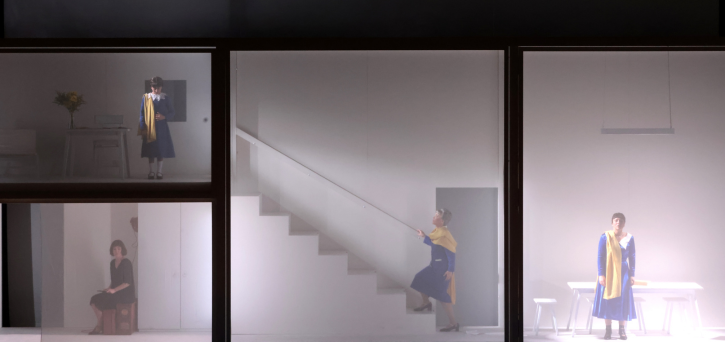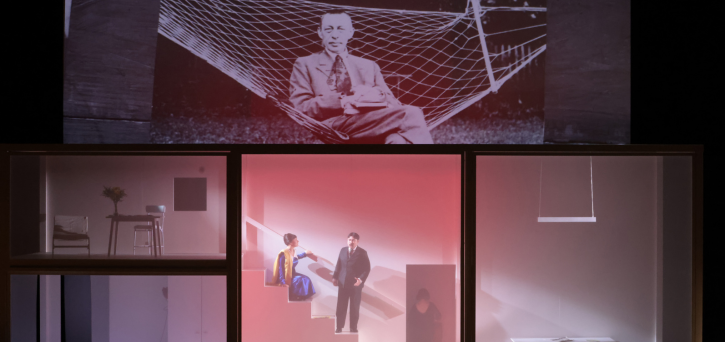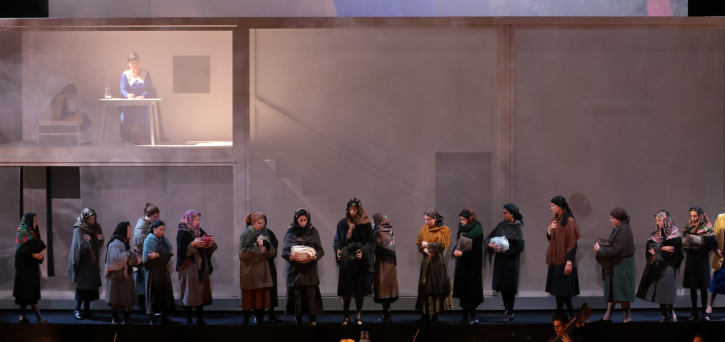Silvia Colasanti returns to the operatic stage with Anna A., commissioned by Teatro alla Scala — on stage from September 28 to December 2 2025. The work is inspired by the life of the Russian poet Anna Akhmatova (1889–1966), whose voice stands as a symbol of artistic freedom and resistance during the Soviet era. The libretto, written by Paolo Nori with Fabrizio Sinisi, unfolds through a musical language that blends lyricism, rhythm, and introspection.
Directed by Giulia Giammona, with set design by Lisa Behensky and costumes by Giada Masi, Anna A. is conducted by Anna Skryleva and performed by the musicians of the Accademia Teatro alla Scala.
The project embodies Colasanti’s vision of a music that “bears witness to its time” — poised between poetic imagination and civic consciousness.
Trailer
About Anna A.
Lidija Chukovskaya - who was fighting to save her husband, who had actually already been killed - visits Anna Achmatova - whose son Lev has been arrested for the second time - almost every day. While awaiting sentencing, Anna travels to Leningrad's Crosses Prison, meeting with the mothers of other prisoners, whose voice she will become, partly at the explicit request of the other women to turn this dramatic experience into poetry. The encounters between Lidija and Anna in 1966 are not only the moment when the poet consigns her poems to her friend's memory, but they leave room for memories of her marriage to Nikolai Gumilëv, her friendship with the poet Osip Mandel'štam, the letter she writes to Stalin begging him to free her son Lev and her second husband Punin.
And again Pasternak, Bulgakov, Marina Cvetaeva and the entire world of Russian writing and poetry of the first half of the twentieth century will bring to the stage with Anna their exemplary stories, traversing the most diverse registers, from melancholy to the tragic nature of love affairs, to the destructive and senseless obsession of power that tries in vain to suppress the voice of art, to the lament and prayer in which Anna becomes the voice of all mothers who mourn their children. Power, as an allegorical, seductive and enchanting character, will enter the scene just before the finale: like Dostoevsky's Grand Inquisitor, it will sing of man's fear and desire to be free, the burden of freedom, on which Power itself builds its strength.
In an essentially classical ensemble, the timbres of typical Russian instruments will find their place, just as within today's musical language the memory of Russian folk stylings, dance rhythms, the evocation of polkas and waltzes will surface. Anna's most intimate voice has a counterpart in the orchestra in a solo violin, tirelessly singing throughout the ‘horrible and wonderful’ experiences of her story.
Full presentation of the opera
Interview to Silvia Colasanti
Learn more
Poetry agaist power, interview to Silvia Colasanti
Writing the libretto for Anna A., interview to Paolo Nori
Press quotes
Silvia Colasanti's Opera World Premiere Marks a Historic Milestone for La Scala. [...] Colasanti's score, lasting about seventy minutes, is agile, transparent, and surprisingly accessible. It is crafted with an economy of means that never turns minimalist. [...] The result is music that is alive, elegant, and communicative.
OperaWire
“
Anna A.” 's debut [...] was a success. Especially for Silvia Colasanti, the first female composer to be commissioned by Piermarini, who was applauded not for her gender but for her undeniable musical talent.
La Repubblica
A language that does not console but moves, hurts. “Anna A.” speaks to schools and universities, of course; but she also speaks to those who believe themselves to be “adults” and worldly-wise. Because what she brings to the stage – oppressed and stubborn poetry, seductive and ferocious power, motherhood as a rock, community as a choir – does not belong to a particular era: it concerns us today, tomorrow. And if it is true, as Power says, that freedom is “just a word”, then the song that refutes this here is not an ornament, but a civil act in the form of poetry.
Huffington Post

Great musical theatre is written by those who know how to perfectly match vocal and instrumental sound to words, creating a wide variety of atmospheres that are all integrated with each other along a coherent dramatic path, where the most complex construction appears simple because it is always easy to follow: Silvia Colasanti knows how to do this, and she does it very well.
Il Giorno
A highly refined score built entirely on words, with captivating melodic openings and perfectly calibrated melologues [...] beautifully orchestrated, which is always the case today, but equally well written for the voices, which is almost never the case.
La Stampa

The premiere of Anna A.'s opera is convincing [...] it has a very solid structure. [...] Silvia Colasanti has the ability to move from one of the three formulations to another with extreme lucidity and clarity, always measuring the sound effects, even when she alludes to Russian folklore.
Il Giornale della Musica
Silvia Colasanti effectively and sensitively juxtaposes different planes, intertwining song and prose. An intense, fascinating, dense and dramatic score, extremely multifaceted and layered, refined and exciting.
Connessi all'Opera

An opera that speaks to everyone, the inestimable value of poetry, the crucial relationship between Art and Power, the tragic looming of totalitarianism [...], the nostalgic but necessary value of memory. The essentially neoclassical intention of Silvia Colasanti's score is consistent and well developed. Using evocative, magnetic references, it seduces the listener, often drawing on implicit popular material.
Music Paper
photos: © Brescia e Amisano / Teatro alla Scala